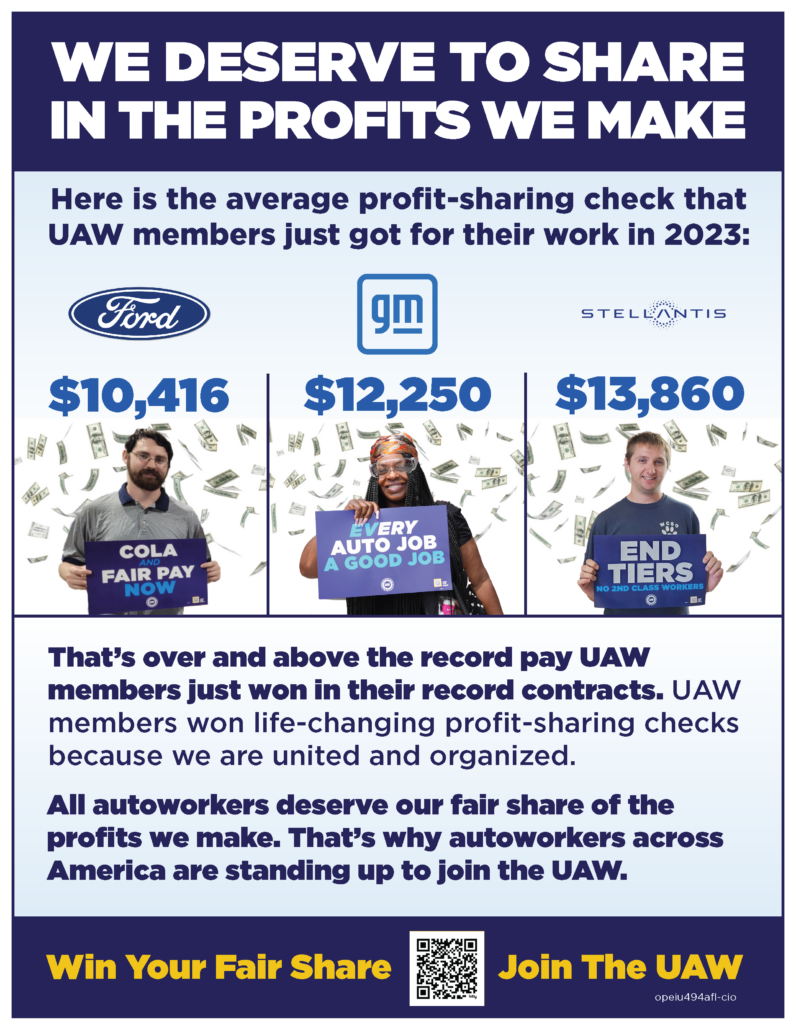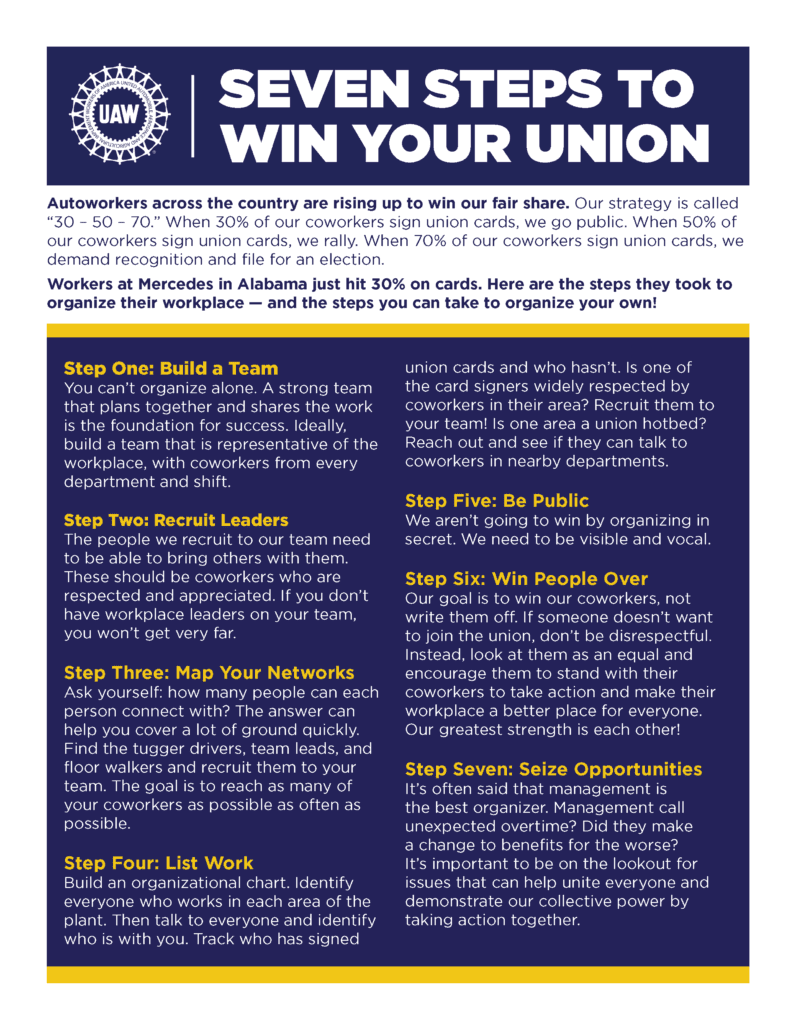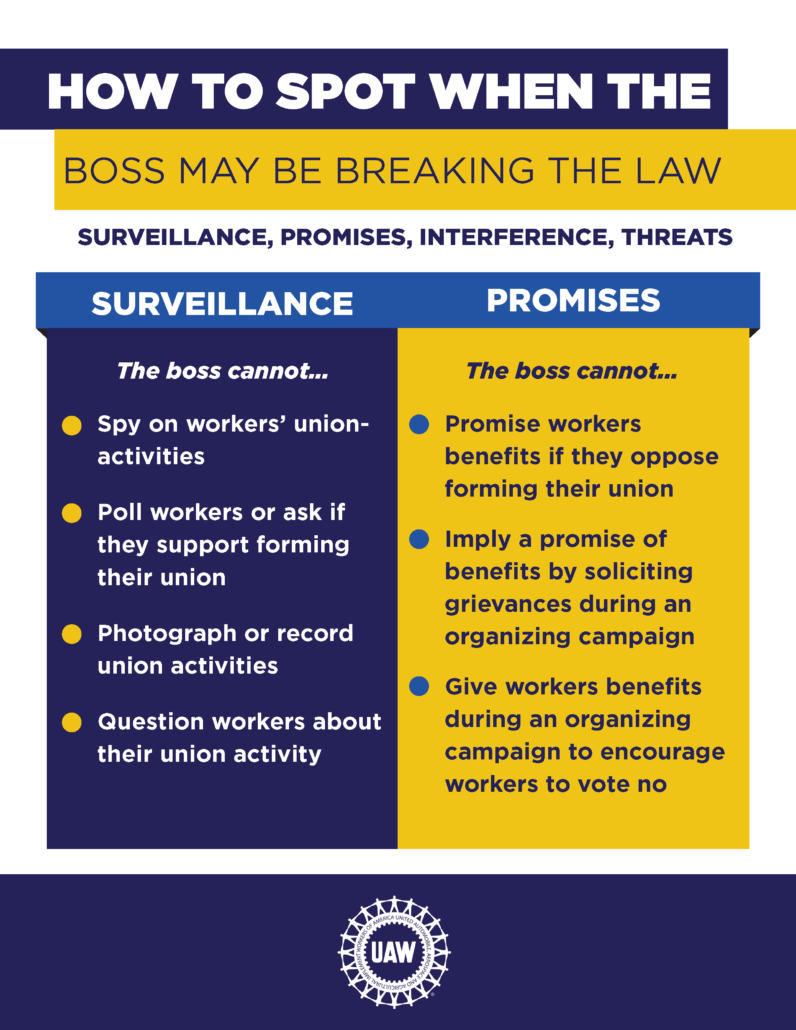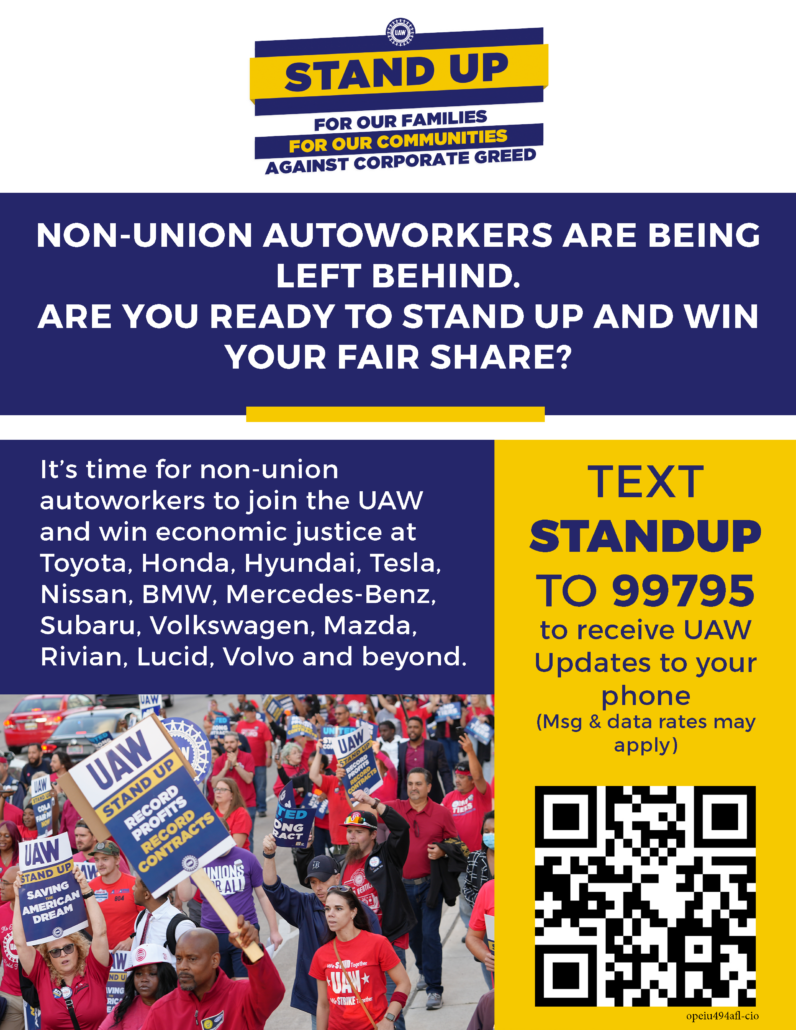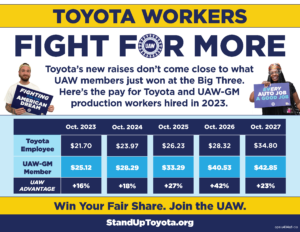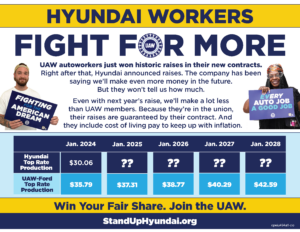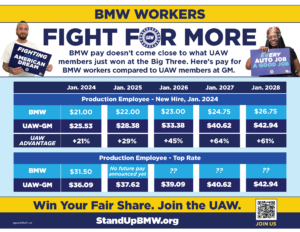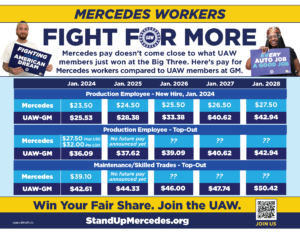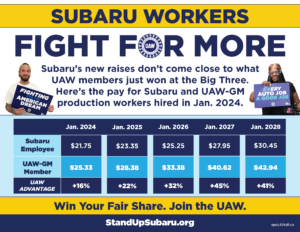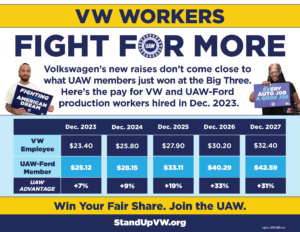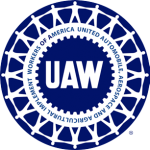RESOURCES
To Stand Up and win your union, you need to spread the word. Click on the flyers and other resources below so you can share them with your coworkers.
FREQUENTLY ASKED QUESTIONS (FAQ)
What’s a union, and how does it work?
A union is any group of workers who come together to collectively advocate and bargain for their rights at work. Unions have legal rights — and more importantly — the strength in numbers, to win improvements at work. Unions are run by and for the members, who vote on contracts, on leadership, and decide how the union operates. When you form a union, the union is YOU and your coworkers. The United Auto Workers (UAW) is a national union that has been around for nearly 90 years, improving wages, benefits, working conditions, and rights on the job for autoworkers and all kinds of workers across the country.
How do we form a union at our workplace?
There are lots of ways to unionize under the law, but they all involve building a majority of support among your coworkers for a union. That means talking to your coworkers about their issues, listening to concerns, and making a plan to come together in common cause for a better life on the job. You and your coworkers are the union – so you’ll need to talk to your coworkers about the issues they care about, in order to build majority support for a union.
What’s a union authorization card?
A union card, or union authorization card, is a card you sign to show you support forming a union in your workplace. There are different legal paths to forming a union, but one involved going through the National Labor Relations Board. If enough of you and your coworkers sign a union card, you can hold a vote. If a majority vote “yes,” you’ve won your union! But often times, corporations and management will fight the unionization process – they don’t want to have to increase wages or benefits, or give you the rights on the job that come with a union contract. So it takes commitment and teamwork to get to a majority of your coworkers signed up on union cards.
What is the Voluntary Organizing Committee or "VOC" ?
The Organizing Committee (OC) or Volunteer Organizing Committee (VOC) is the group of workers who visibly and actively help to organize and establish a union in each workplace. Workers from different areas and shifts help educate co-workers about the union, sign up co-workers on union authorization cards and organize and lead other actions when necessary. Who are the workers you think must be a part of the VOC in order to win at your plant?
How do I find out who is on the VOC in my workplace?
Send an email to standupuaworganizing@uaw.net and someone from your VOC will get back to you.
What is the 30 - 50 - 70 strategy?
“30-50-70″ is our plan not just to win a union, but to win a strong union, and a strong union contract. When 30% of us sign cards in our plant, our Volunteer Organizing Committee (VOC) will publicly announce that we are forming a union. When 50% have signed cards, we will hold a big rally with our co-workers, UAW President Shawn Fain, community leaders, and other allies showing that a majority of us are willing to fight for our union. When 70% of us have signed cards, and we have a VOC from every department, line and shift, we will demand the company recognize our union – or take it to a vote, and win.
How will we know the status of the campaign at our company?
We encourage every single one of our coworkers to get actively involved. If you want to learn more about the status of organizing in your workplace, reach out to your VOC. If you don’t know who is on your VOC, send an email to standupuaworganizing@uaw.net and someone will get back to you.
What if I‘m talking to my coworkers and I don’t have all the answers to their questions?
It’s great that you’re talking to your co-workers about forming a union! That’s the most important thing you can do to build your union. And it’s okay if you don’t know the answers to every question. If someone asks you a question you are unable to answer, say you will get back to them and then reach out to your VOC to discuss an accurate and effective answer.
My coworker said they were worried our boss would fire us or target us for publicly supporting the union. What do I say?
Federal law protects our right to organize a union. That doesn’t mean bosses don’t break the law, but it does mean you have some protection. In fact, your best protection is the fact that thousands of autoworkers are currently standing up to form unions with the UAW across the country, across over a dozen companies. While company retaliation would be illegal, our greatest protection is each other. By joining together and building public support for the union, we make it much harder for the boss to single any of us out individually. A union is all about strength in numbers.
Why is it important to get more than 50% or our coworkers to sign cards?
We don’t just want a union. We want a strong union, and a strong union contract. Overwhelming majority support will give us the power to not just establish our union, but also the power to win the kind of major improvements we deserve: better pay, better benefits and real rights on the job—just like UAW members just won at the Big Three.
Management has said if we sign a card, then we are giving up our rights to the UAW. Is that true?
Companies often try to convince workers that we are giving something up by signing a union card. The reality is that forming a union means having more rights and more power, not less—which is why most companies spend so much money and energy trying to convince us to not unionize. Signing a card means one thing: you support forming a union with the UAW to represent you in collective bargaining.
What is collective bargaining? How does that work?
Collective bargaining is all about strength in numbers. Instead of individuals going up against a powerful corporation, you and your coworkers come together – collectively – to negotiate a better deal with your employer. Think about what would happen if one of your coworkers asked for a raise. Then think about what would happen if all of your coworkers asked for a raise.
Under collective bargaining, we elect representatives to negotiate on equal footing with our employer and put the terms of our employment into a legally binding contract. Through collective bargaining, unionized workers have successfully negotiated improvements in wages, hours, benefits, and other terms and conditions of employment—which is why companies pull out the stops to block employees from unionizing.
Without collective bargaining, management has the unilateral power to change our working conditions any time they want. A non-union auto company can currently determine unilaterally whether or not we receive predictable pay increases, the quality and cost of our benefits, or any other policies that affect our work in the plant every day. Without a contract, anything the company gives, the company can also take away. A collectively bargained union contract forces the company to commit to specific, enforceable terms about our wages, benefits, and rights on the job.
Supervisors are saying UAW dues are very expensive. How much are membership dues and when do we start paying?
In the UAW, we do not pay a dime in membership dues until we have gone through the bargaining process and voted democratically to approve our first contract. UAW dues are 2.5 hours of straight-time pay per month. For someone making $25 an hour, that’s $62.50 per month. Let’s put that into perspective.
Most Big Three autoworkers just got a raise from about $32 an hour to about $42 an hour over about four years. That’s about $1700 more a month, for the cost of $80-$100 a month in dues. Would you take that deal? Most workers would. And that’s just the wages, let alone the benefits, job protections, and rights on the job.
Dues are important because they provide the resources necessary to build and sustain a strong union and rights in the workplace. It takes resources to have a strong union, from the earliest stages of forming a union for the first time, to bargaining and campaigning for the first contract, to enforcing rights under an existing contract, and providing strike benefits if we decide democratically to go on strike like Big 3 workers did recently. Dues provide those resources.
How do we combat all the misinformation the employer is putting out there?
It’s no secret that management and corporations are willing to lie if it will save them money. It is common for employers to try to convince workers not to organize a union. Now that thousands of us are organizing across the United States, our employers are spreading misleading information in an attempt to discourage us. We know better.
The best way to combat company misinformation is by educating ourselves about what it means to have a union and engage in collective bargaining and talking to our co-workers. It’s our job to talk to our coworkers and not let the boss be the only voice in the room. Building a VOC that includes organizers from every part of the workplace on every shift will put us in the best position to overcome the employer’s divide-and-conquer schemes.
Is it okay to just leave flyers and pamphlets laying around anonymously so nobody can be targeted by management?
This might seem like a safe strategy, but the most effective way to build a strong union is to build a VOC that includes workers across the plant who are willing to be visible—that means having the courage to publicly talk to, share information with, and answer questions from our co-workers about why we are forming a union and, when necessary, organize and coordinate workplace actions. There’s no substitute for talking to your coworkers and having real, face-to-face conversations.
Will my supervisor see my card?
I get why you’d think we need to be secretive. But we won’t win in the shadows. And we won’t successfully win our fair share of the profits create if we’re afraid. The Stand-Up campaign is about showing each other and our company that we are tired of broken promises and living in fear of being targeted. To win our union and our contract, we are going to show at 30%, 50% and 70% that we are together and stronger than we’ve ever been.
The question facing us is: Are we going to live in fear and keep getting short-changed, or Stand Up together and win our union and UAW contract?
TOYOTA
Toyota has made a quarter of a trillion dollars in profit in the past decade. Profits are up 30%. CEO Pay is up 125%. Meanwhile, Toyota has offered just a 9% raise to convince Toyota workers NOT to organize. It’s time for Toyota workers to Stand Up and fight for more
RESOURCES
Spread the word! Click the flyer below to download a printable PDF version:
INCREASED PROFITS
INCREASED CEO PAY
INCREASED VEHICLE PRICES
DOUBLED
HONDA
Honda’s vehicle prices are up 30 percent in the past three years, while CEO pay has more than doubled. Honda makes more than half of its revenue in the U.S., but American Honda workers are being left behind. It’s time for Honda workers to Stand Up and fight for more
HYUNDAI
Hyundai’s profits are up 75 percent over the last three years. Their vehicle prices are up 32 percent. The company announced a 25 percent raise by 2028 to try to match the Big Three, but Hyundai workers will still lag far behind in pay, benefits, and rights on the job. It’s time for Hyundai workers to Stand Up and fight for more.
RESOURCES
Spread the word! Click the flyer below to download a printable PDF version:
INCREASED PROFITS
INCREASED VEHICLE PRICES
DOUBLED
BILLION IN CEO’S NET WORTH
TESLA
Elon Musk is the richest man in the world, with a net worth of $230 billion. U.S. production has more than doubled since 2020, and Tesla’s sales are booming. The question is, will Tesla workers get their fair share? It’s time for Tesla workers to Stand Up and fight for more.
NISSAN
Nissan made nearly a trillion dollars in revenue in the past decade. Over 80% of Nissan’s North American revenue is generated in the U.S. Nissan parts distribution workers just won a UAW contract. Now it’s time for every Nissan worker to win their fair share. Profits are way up, and workers are even further behind. It’s time for Nissan workers to Stand Up and fight for more.
BILLION IN CORPORATE PROFITS IN PAST 10 YEARS
LEFT BEHIND
INCREASED PROFITS IN PAST 3 YEARS
MILLION IN EXECUTIVE COMPENSATION
BMW
BMW’s profits are up over 130 percent over the past three years. Instead of giving BMW workers their fair share, the company is spending billions on stock buybacks and over $30 million on compensation for just seven top executives. It’s time for BMW workers to Stand Up and fight for more.
RESOURCES
Spread the word! Click the flyer below to download a printable PDF version:
MERCEDES
Mercedes’s profits have grown by 200% in just the past few years. From March to November 2023, the company spent $1.9 billion on stock buybacks instead of sharing those record profits with their workforce. It’s time for Mercedes workers to Stand Up and fight for more.
RESOURCES
Spread the word! Click the flyer below to download a printable PDF version:
INCREASED PROFITS IN PAST FEW YEARS
BILLION IN STOCK BUYBACKS
REVENUE GENERATED IN US
LEFT BEHIND
SUBARU
Over 70 percent of Subaru’s revenue is generated here in the United States. And all of their North American production happens in one plant in Indiana. Yet those workers aren’t seeing their cut of the company’s billions in profits. It’s time for Subaru workers to Stand Up and fight for more.
RESOURCES
Spread the word! Click the flyer below to download a printable PDF version:
VOLKSWAGEN
Volkswagen’s profits are up more than 60 percent over the past three years, and their vehicle prices have soared by more than 40 percent. VW workers in Tennessee are being left behind while just 13 top executives rake in a combined $60 million. It’s time for VW workers to Stand Up and fight for more.
RESOURCES
Spread the word! Click the flyer below to download a printable PDF version:
INCREASED PROFITS OVER THE PAST 3 YEARS
INCREASED VEHICLE PRICES
ROLLING IN
LEFT BEHIND
MAZDA
Mazda just opened their one U.S. plant in Alabama, investing billions because they know the profits will keep rolling in. But Mazda workers aren’t getting their fair share, while profits and vehicle prices rise. It’s time for Mazda Workers to Stand Up and fight for more.
RIVIAN
Rivian is on the rise, but will Rivian workers rise with the company, or fall behind? Their billionaire CEO has nothing to worry about, but Rivian workers’ pay lags behind the Big Three. It’s time for Rivian workers to Stand Up and fight for more.
ON THE RISE
LAGS BEHIND THE BIG 3
379 MILLION
SAUDI INVESTMENT FUND
LUCID
In 2022, Lucid CEO Peter Rawlinson raked in $379 million. Lucid workers are getting left behind even though the company has access to the deepest pockets in the world, the Public Investment Fund of Saudi Arabia. It’s time for Lucid workers to stand up and fight for more.
VOLVO
Volvo Car USA has made over a quarter of a trillion dollars in revenue over the last decade. The company’s CEOs made $44 million over the last seven years, but Volvo workers are getting left behind. It’s time for Volvo workers to stand up and fight for more.
BILLION IN CORPORATE REVENUE IN PAST TEN YEARS
MILLION IN CEO PAY OVER THE LAST SEVEN YEARS
INCREASED PROFITS IN LAST TWO YEARS
RISE IN CO-CEO PAY FROM ’21 TO ’22
KIA
Kia’s operating profit rose 129% in just the last two years. The company’s co-CEOs saw their combined pay jump 67% from 2021 to 2022. And in 2023, the company’s profit, revenue and sales set all-time records. But as Kia’s profits and executive pay soar, Kia workers still lag far behind in pay, benefits, and rights on the job. It’s time for Kia workers to stand up and fight for more.
WHEN THE BOSS MAY BE BREAKING THE LAW: KNOW YOUR RIGHTS!
Thousands of non-union workers are organizing to join the UAW! It is illegal for employers to Surveil, Promise, Interfere, or Threaten workers against forming their union. Here are a video and a flyer that tell when your boss may be breaking the law, and what you can do to stop it.
Do you think your employer may be breaking the law? Fill out the form below and let us know what’s happening at work, and UAW’s legal and organizing teams will follow up with you.
